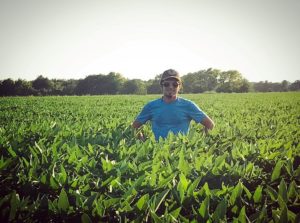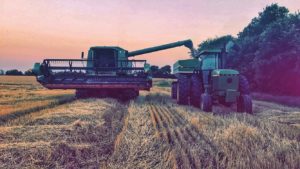
When Davidson turned 18 in 2012, he graduated high school and immediately planned to start a farming operation.
By Shawn McCowan, Texas FSA
Dakota Davidson, a beginning farmer in Deport, Texas, knew early on his future was planted in farming. Dakota now owns and operates Davidson Farms, growing wheat, corn and soybeans.
Rooted in Agriculture
Dakota grew up surrounded by agriculture.
When Dakota turned 18 in 2012, he graduated high school and immediately planned to start a farming operation of his own.
“Agriculture is something I’ve always been around. I’ve always dreamed of having a farm of my own,” he said.
All he needed was business guidance, land, equipment and financing.
Dakota’s father, Jackie, provided sound guidance and allowed him to borrow machinery until he could afford his own. A few local farmers considered retiring and Dakota’s youthful charisma inspired them. One became a mentor, while others transferred land leases or equipment to him.
Growing an Operation
Within a few months, Dakota acquired nearly 150 acres and enough equipment to get started. His next step was to visit the USDA Farm Service Agency (FSA) at his local USDA service center in Lamar County.
Dakota met with David Dunmon, an FSA farm loan manager who helped him apply for a beginning farmer loan to purchase the remainder of what he needed to plant his first wheat crop.
FSA’s beginning farmer direct and guaranteed loan programs support America’s next generation of farmers and ranchers. While farm ownership loans can provide access to land and capital, operating loans are a resource for farmers and ranchers to start, maintain and strengthen their operations. Microloan programs offer more flexible access to credit for small, beginning and niche agricultural operations.

Davidson earned enough from his first harvest in 2014 to purchase a new grain cart.
Dakota earned enough from his first harvest in 2014 to purchase a new grain cart. Inspired, he set his sights even higher.
By the end of 2016, he paid another visit to this local service center, where he applied for an additional loan to purchase his own tractor and an upgraded planter. Before long, Dakota was planting corn and soybeans on an additional 500 acres.
“I am so glad FSA was there to help me get my first loan. I couldn’t have done this without them,” he said. “Anyone thinking about working in agriculture should find their local office and go meet the people there. I still visit with them and always get good advice.”
Giving Thanks
Between seasons at the new Davidson Farms, he took time to thank everyone who helped him pursue his dream, starting with helping on his father’s 920-acre operation.

By the end of 2016, Davidson applied for an additional loan to purchase his own tractor and an upgraded planter.
“Without the cooperation, help and prayers of those around me, there’s no way I’d be where I am today,” Dakota said. “It’s very important to build a good relationship with people in your community, especially in farming. They got me started.”
Dakota also recognized the many obstacles he had to face as a new farmer, but said he never regretted one minute of it.
“It’s truly been everything I ever hoped it would be,” he said. “Although we’ve fought droughts, floods, harmful insects, wild hogs and poor market prices along the way, I’d do it all again a thousand times over.”
Managing Risk
In addition to using loan programs to expand his operation, Dakota also manages his risk by enrolling his eligible crops in FSA’s Agriculture Risk Coverage (ARC) and Price Loss Coverage (PLC) programs to provide a safety net when there is a substantial drop in prices or revenues.
He further protects his commodities with federal crop insurance administered by the USDA Risk Management Agency.
More Information
For more information about USDA programs and services, contact your local USDA service center.
USDA offers a variety of risk management, disaster, loan and conservation programs to help agricultural producers in the United States weather ups and downs in the market and natural disasters as well as invest in improvements to their operations. Learn about additional programs.
Through many programs and opportunities, USDA provides support to beginning farmers and ranchers, veterans and people transitioning from other industries to agriculture. Explore USDA’s resources for new farmers.
JOIN THE CONVERSATION
For the digital version of this blog, visit #Fridaysonthefarm.
Follow the #Fridaysonthefarm story series and other news you can use on farmers.gov and @Farmersgov Twitter.





